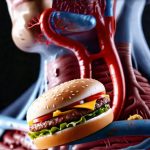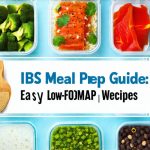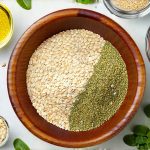The modern diet often leans heavily on convenience, and few foods embody this more than instant noodles. Quick, affordable, and readily available, they’ve become a staple for students, busy professionals, and anyone seeking a fast meal solution. However, beneath the appealing simplicity lies a nutritional profile that, when consistently relied upon, can contribute to a surprising range of health concerns – including what some individuals describe as “loose movements” or digestive disturbances. This isn’t necessarily about immediate illness from a single bowl; rather, it’s the cumulative effect of prolonged and unbalanced reliance on these products that raises questions regarding long-term wellbeing and gut health. Understanding why instant noodles might contribute to such issues requires delving into their composition, how our bodies process them, and what essential nutrients are typically missing when they become a dietary mainstay.
The issue isn’t so much the noodle itself (though even that has implications), but rather the overall nutritional imbalance created by an instant noodle-centric diet. These meals frequently lack fiber, crucial vitamins and minerals, and sufficient protein. This can disrupt the delicate ecosystem of the gut microbiome – the trillions of bacteria residing in our digestive system – leading to compromised digestion, altered bowel habits, and potential nutrient deficiencies. While anecdotal reports of “loose movements” are common, pinpointing instant noodles as a direct cause is complex; it’s more accurate to consider them a contributing factor within a broader context of dietary inadequacy. This article will explore the mechanisms through which frequent consumption can impact digestive health, along with strategies for mitigating potential issues and promoting a more balanced approach to nutrition.
Nutritional Deficiencies and Gut Health
Instant noodles are primarily composed of refined carbohydrates – starch from wheat flour – and often contain significant amounts of sodium, fat (sometimes saturated or trans fats), and flavorings achieved through additives and processed ingredients. What’s notably missing is a substantial amount of dietary fiber. Fiber serves as the primary food source for beneficial gut bacteria, promoting their growth and diversity. Without adequate fiber intake, the microbial balance can shift, favoring less desirable bacteria that contribute to inflammation and digestive discomfort. This imbalance can disrupt normal bowel function, potentially leading to diarrhea or loose stools.
Furthermore, the lack of essential nutrients like vitamins (A, B, C, D), minerals (iron, zinc, magnesium), and protein hinders the body’s ability to maintain healthy gut lining integrity. A compromised gut lining is more permeable (“leaky gut”), allowing undigested food particles and toxins to enter the bloodstream, potentially triggering immune responses and exacerbating digestive symptoms. The high sodium content can also draw water into the intestines, contributing to looser stools, especially in individuals sensitive to salt intake. The reliance on processed ingredients instead of whole foods means essential amino acids for gut repair are lacking, further weakening its function over time.
Finally, many instant noodle varieties contain additives like guar gum or xanthan gum to improve texture. While these gums aren’t inherently harmful, excessive consumption can sometimes lead to gastrointestinal distress in sensitive individuals, again contributing to altered bowel habits. It’s the combination of these factors – fiber deficiency, nutrient imbalances, and potential additive sensitivities – that creates a perfect storm for digestive upset. Understanding how gut issues can develop is key to prevention.
The Role of Sodium & Fat
The high sodium content in instant noodles isn’t merely about water retention leading to bloating or loose stools; it impacts electrolyte balance which is crucial for proper muscle function including the muscles of the digestive tract. An imbalance can disrupt peristalsis – the wave-like contractions that move food through the intestines – potentially speeding up digestion and resulting in looser stool consistency. Chronic high sodium intake also stresses the kidneys, impacting overall fluid regulation within the body.
The types of fats used in instant noodles are often less desirable from a health perspective. Many brands utilize palm oil, which is high in saturated fat, or partially hydrogenated oils containing trans fats – both linked to inflammation and potential gut microbiome disruption. Excessive fat intake can overwhelm the digestive system, leading to malabsorption and symptoms like diarrhea. Moreover, these fats are often poorly digested, leaving residue in the intestines that contributes to discomfort and altered bowel movements. Consider how high-fat diets impact your system.
It’s important to understand that fat isn’t inherently bad; healthy fats (like those found in avocados or olive oil) are essential for nutrient absorption and overall health. However, the type of fat and quantity matter significantly. The fats prevalent in instant noodles rarely fall into the “healthy” category, contributing negatively to digestive function and potentially exacerbating existing gut issues. If you often experience discomfort, it may be time to explore can acid reflux be a factor.
Mitigating Digestive Issues: Dietary Adjustments
If you frequently consume instant noodles and experience digestive discomfort, several dietary adjustments can help alleviate symptoms and promote better gut health.
- Increase Fiber Intake: This is arguably the most critical step. Incorporate fiber-rich foods into other meals – fruits, vegetables, whole grains, legumes, and nuts/seeds. Even adding a side of steamed broccoli or a handful of berries to your noodle meal can make a difference. Aim for at least 25-30 grams of fiber per day.
- Hydrate Adequately: Drinking plenty of water helps counteract the dehydrating effects of sodium and aids in digestion. Water also softens stool, making it easier to pass and reducing constipation or diarrhea.
- Protein Power-Up: Ensure you’re getting enough protein from other sources – lean meats, poultry, fish, eggs, beans, lentils, or tofu. Protein is essential for repairing the gut lining and maintaining overall digestive health.
Adding Nutritional Value to Instant Noodles
Completely eliminating instant noodles might not be realistic or desirable for everyone. Instead, consider ways to enhance their nutritional value:
- Boost with Veggies: Add frozen or fresh vegetables during cooking – spinach, carrots, peas, mushrooms, etc. This instantly increases fiber and vitamin content.
- Protein Integration: Incorporate a protein source – cooked chicken, shrimp, tofu, or an egg. This helps balance the meal and provides essential amino acids.
- Healthy Fat Addition: A small amount of avocado slices or a drizzle of sesame oil can add healthy fats and improve flavor without significantly increasing unhealthy fat content.
- Spice it Right: Adding spices like ginger or turmeric can help aid digestion and reduce inflammation, offering further benefits beyond taste.
Long-Term Gut Health Strategies
Addressing the potential impact of instant noodle diets requires a holistic approach to gut health that extends beyond simply modifying your noodle consumption:
- Probiotic & Prebiotic Foods: Regularly consume foods rich in probiotics (yogurt, kefir, sauerkraut) and prebiotics (garlic, onions, bananas) to support a healthy microbiome. Probiotics introduce beneficial bacteria, while prebiotics nourish their growth.
- Mindful Eating Practices: Pay attention to how your body reacts to different foods. Slow down during meals, chew thoroughly, and avoid overeating. This aids digestion and reduces the strain on your digestive system.
- Stress Management: Chronic stress can negatively impact gut health. Incorporate stress-reducing activities into your routine – yoga, meditation, deep breathing exercises, or spending time in nature. A calmer mind often translates to a healthier gut.
- Regular Exercise: Physical activity promotes healthy digestion and reduces inflammation. Aim for at least 30 minutes of moderate-intensity exercise most days of the week.
If you experience frequent discomfort it is important to consider can bloating be a factor, and whether throat burning is present as well. Many individuals also wonder if frequent nausea could be a symptom. Finally, recognizing potential issues like liver problems is key for long term health.
It’s crucial to remember that everyone’s digestive system is unique, and sensitivities vary. If you experience persistent or severe digestive issues, it’s essential to consult with a healthcare professional to rule out underlying medical conditions and receive personalized advice. This article provides information for educational purposes only and should not be considered a substitute for professional medical guidance.


















